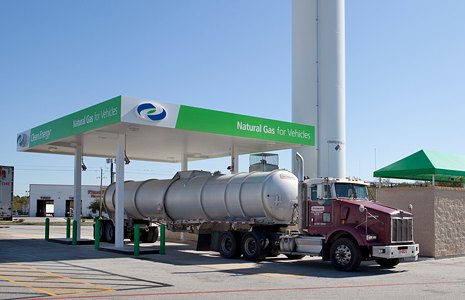Gas Will Get Cheap And Plentiful - That Other Gas Causes A Glut

Reuters has a highly interesting oil and gasoline story. If you are one of the “peak oil” types
So much money is made to convert crude oil in to motor fuels, that power and industry can’t afford it, making power and industry switch to other fuels, mostly gas. Motor fuels however is a low growth industry. What’s more, it could also easily switch to natural gas. The effect is an oil glut.
- BP predicts a worldwide oil demand growth of just 0.8 percent a year up to 2030 – slower than for any other energy type and only half the projected total energy demand growth rate over the same period.
- Transport is slow growing as cars are getting more efficient. BP’s Outlook 2030 study shows the fuel economy of new cars in the United States and China falling well below 5 liters per 100 kilometer by 2030 from between 7 and 8 now.
- In OECD countries, transport fuel demand is set to actually fall as weak economies, a shift to smaller cars, and a move onto public transport in congested urban areas take a further toll.
- Worldwide, gas, biofuels and other alternatives are expected to steal almost a third of what growth there might be.
Gas is already approaching a similar overall market share to oil in the world’s energy mix. Liquefied natural gas (LNG) already is a viable transport fuel, and oil executives are starting to see a point at which familiarity and availability could tip the balance away from diesel and gasoline. Big oil players are already heavily invested in LNG.
LNG is expected to replace diesel in trucks and buses, ships, even airplanes first, before it makes a difference in private cars some decades away.
LNG-powered ships are already a reality. The first commercial gas-powered civil aircraft flight left Doha for London on Jan. 9 this year, fueled by jet fuel made from gas.

Bertel Schmitt comes back to journalism after taking a 35 year break in advertising and marketing. He ran and owned advertising agencies in Duesseldorf, Germany, and New York City. Volkswagen A.G. was Bertel's most important corporate account. Schmitt's advertising and marketing career touched many corners of the industry with a special focus on automotive products and services. Since 2004, he lives in Japan and China with his wife <a href="http://www.tomokoandbertel.com"> Tomoko </a>. Bertel Schmitt is a founding board member of the <a href="http://www.offshoresuperseries.com"> Offshore Super Series </a>, an American offshore powerboat racing organization. He is co-owner of the racing team Typhoon.
More by Bertel Schmitt
Latest Car Reviews
Read moreLatest Product Reviews
Read moreRecent Comments
- Wolfwagen Pennsylvania - Two long straights, 1 medium straight, 1 super short straight and a bunch of curves all on one end
- Haze3 EV median weight is in the range of 4500-5500lbs, similar to the low end of full size pickup trucks and SUV's or typical mid-size PU's and SUV's. Obviously, EV Hummers and PU's are heavier but, on average, EV=PU or mid/full SUV is about right. EV's currently account for ~1% of the cars on the road. PU's account for 17% and SUV's count for over 40%. If we take out light SUV's, then call it 30% SUV or so. So, large-ish PU's and SUV's, together, account for ~50% of the US fleet vs 1% for EV's. As such, the fleet is ALREADY heavy. The problem is that EV's will be making the currently lighter 50% heavier, not that PU/SUV haven't already done most of the damage on avg mass.Sure, the issue is real but EV responsibility is not. If you want to get after heavies, that means getting after PU/SUV's (the current problem by 40-50x) first and foremost.
- Redapple2 Telluride over Acadian (sic-tip cap-canada). 1 better car. 2 60 % us/can content vs 39 THIRTY NINE for an "American" car. 3 no UAW labor. Smart people drive Tellurides. Not so smart for the GMC. Dont support the Evil GM Vampire.!
- Theflyersfan My dad had a 1998 C280 that was rock solid reliable until around 80,000 miles and then it wasn't. Corey might develop a slight right eyelid twitch right about now, but it started with a sunroof that leaked. And the water likely damaged some electric components because soon after the leaks developed, the sunroof stopped working. And then the electrical gremlins took hold. Displays that flickered at times, lights that sometimes decided illumination was for wimps so stayed home, and then the single wiper issue. That thing decided to eat motors. He loved that car but knew when to fold the hand. So he bought a lightly used, off lease E-class. Had that for less than two years before he was ready to leave it in South Philly, keys in the ignition, doors unlocked, and a "Take it please" sign on the windshield. He won't touch another Benz now.
- Detlump A lot of people buy SUVs because they're easier to get in and out of. After decades of longer, lower, wider it was refreshing to have easier ingress/egress offered by an SUV.Ironically, the ease of getting in and out of my Highlander is very similar to my 56 Cadillac.


































Comments
Join the conversation
I wonder if the analysis takes into account (it is not mentioned) emerging economies such as China, India, Russia, Brazil and large parts of Africa. As their economies grow the growth in vehicle ownership will hugely out pace population growth. Considering the low-tech, poorly maintained vehicles that these poorer nations will be using their demand for fuel could be dramatically more than in Europe, UK, Australia and the USA.
Don't know why this article would upset anyone who "believes" in peak oil. We're already at or past the peak for traditional Arabian oil. That fact hasn't changed. Oil Shale finds are proving to lose productivity not long after they are tapped. Peak Oil, there, done with. That's it. And all the alternatives cost more to develop, because no way in hell is anybody drilling for Oil Shale for lower margins. Only LNG makes as much sense as gas or diesel... or even more sense... but adoption slowed after gas prices fell back down. LNG won't last forever, but it's a good interim technology with low costs to adoption that can be applied almost universally to our current auto fleet. Except for you lot with those stupid expensive gasoline direct injection motors...